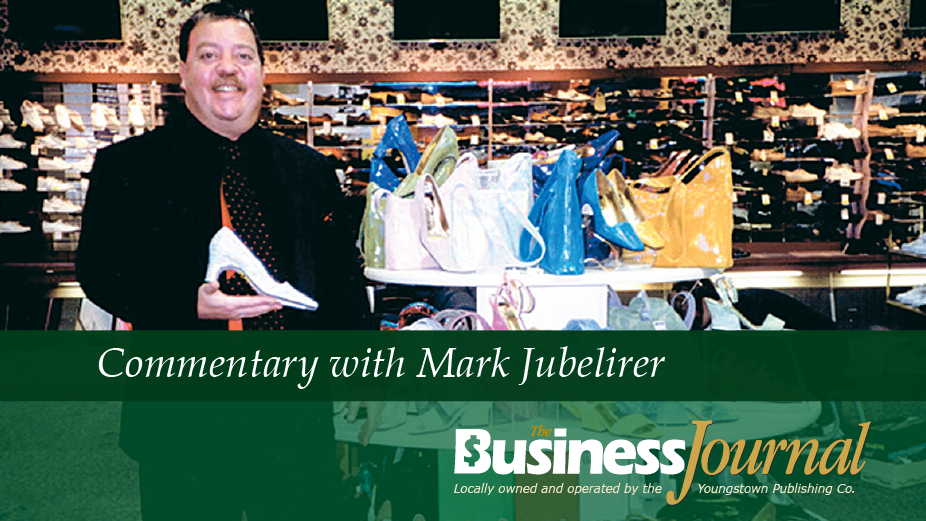Reyers Exec: ‘Gonna Miss Them When They’re Gone’
By Mark Jubelirer, president of Reyers Shoe Store
SHARON, Pa. — I keep reading about the dearth of customer loyalty; the sharp increase in online shopping. About how people are even abandoning malls during the Christmas shopping season. Think about it; empty malls on Black Friday. It’s the Great Pandemic, Charlie Brown.
Once in a century has lasted since last February; it’ll last past next February. It will last until you get your vaccine, and I get my vaccine.
It brings to my mind a parallel epidemic. It began in the late 1960s with three guys. Two of them were Jack Fisher and Vince Camuto. These guys were shoe industry veterans who were still a bit wet behind the ears; they met on an airplane, struck up a friendship and decided to go into business together.
They teamed up with the Japanese Sumitomo Corp. and went to Brazil to source footwear for the domestic Japanese market. They were successful because their product was desirable. The two ambitious men soon dissolved their relationship with the Japanese firm and formed their eponymous company Fisher-Camuto. Their headquarters was located in a skyscraper in New York City, at 9 W. 57th Street. Hence their label. 9 West.
Jack and Vince were the OGs of the shoe industry. They were the first gangsters on the scene. Before them, 97% of all shoes sold here were made here, from Dexter, Maine to California Cobblers; even these two important labels are lost to history; you’ve never heard of them.
Fisher-Camuto blossomed into The Nine West Group. Their shoes were selling like crazy; the looks; the leathers; the styles. They were new, different, and modern. The gangsters fired the bullet that bled out the American shoe factories, as each clamored to retool, reinvent, or perish.
Business books said that it was the big who eat the small; Jack and Vince proved instead that it was the quick who eat the slow. 9 West was first out on the battlegrounds with new styles and colors each season. It used to be that there were four seasons, but these guys introduced new product every six weeks. These two guys did their best to kill our domestic factories. Then they got some help.
Sam Walton came of age and made low prices. Not just low shoe prices but low-priced everything. Ultra-competitive footwear was imported from Brazil and now from China. Whatever good which sprung from Nixon’s opening of China, Sam Walton made evil.
Walmart’s shoes were not made nor sold to service a customer’s needs unless the customer wore a basic size and would settle for basic footwear. Walmart commoditized the product. No more glamour; no high fashion; always low prices. If you were a customer who required specialized fitting in, say, narrow shoes, Walmart couldn’t help you. And neither could Nine West. Young women wanted Nine West shoes; it didn’t matter that the shoes didn’t fit well.
I look at this from my own perspective of course. From our founding in 1886 up through most of our decades, Reyers sold shoes that were made by Americans for Americans. When my father, Harry Jubelirer, bought his little shoe store in 1952 from Carl Reyer, the original owner’s son, Reyers had only been selling shoes for women, and only in narrow widths.
There were six other family shoe stores in downtown Sharon; each had its own piece of the pie; the world was at full retail still and there was an easy truce among them.
Yet my father was ambitious, having learned the business at his father’s knee in Pittsburgh. Harry broke the peace, intending to please every single customer who walked in. As he put other store owners out of business, he would hire them into his management team, thereby keeping the town’s peace. Harry built his shoe store to become the largest in the world, and is recognized today in the National Shoe Retailers’ Hall of Fame.
Yet – whither goest Reyers?
Reyers is today a metaphor. My brother and I are partners, and we are nearing retirement I suppose. Not that we shall welcome it. We’d both like to go another decade and more.
The first epidemic that hit our industry wiped out our factories. We’ve been selling mostly imported shoes ever since. This second epidemic can wipe out the stores which are still left standing.
Don’t cry for us America. We’ll be fine. Americans will be in the habit of shopping online, and they’ll always be able to do just that. And some of you will be newly excited to 3D print them. But others might start to miss us, especially the City Fathers, wondering what happened to their tax base.
And then the ranks of the first responders will dwindle; police, fire, even trash collection will become less frequent. Fewer business owners and employees means less populated chambers of commerce, city councils, and county boards of commissioners all around. No more events like sidewalk sales. Fewer concerts at the Amp, nor in public music halls. Fewer events running the trails in your local park. No such thing again as Waterfire.
Businesses provide the life blood of the community. No restaurants downtown; hardly a hotdog shop; no drug store; no hardware store; no dress shop; no children’s shoe store; no barber shop.
And all across America, we’re gonna miss them when they’re gone.
Copyright 2024 The Business Journal, Youngstown, Ohio.


